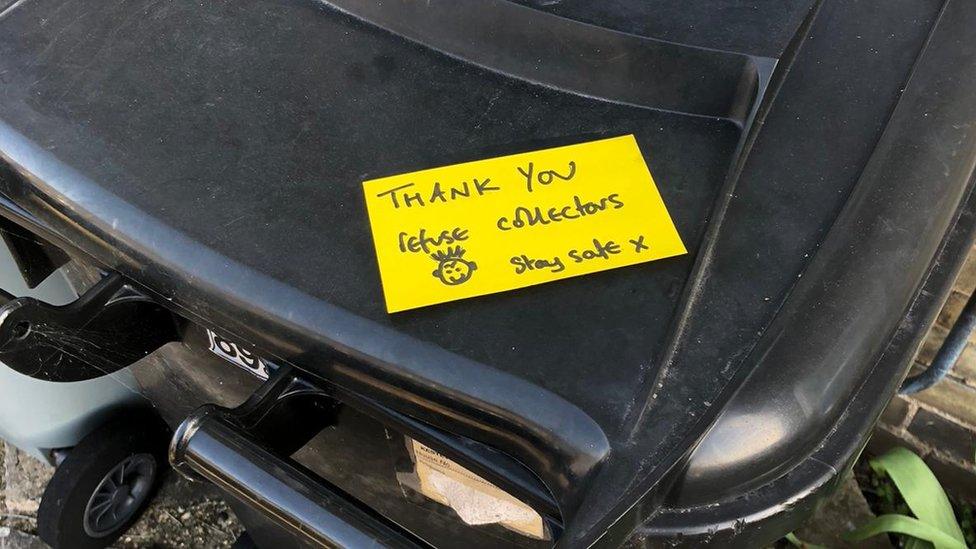Compost: Why are more people dealing with green waste at home?
- Published
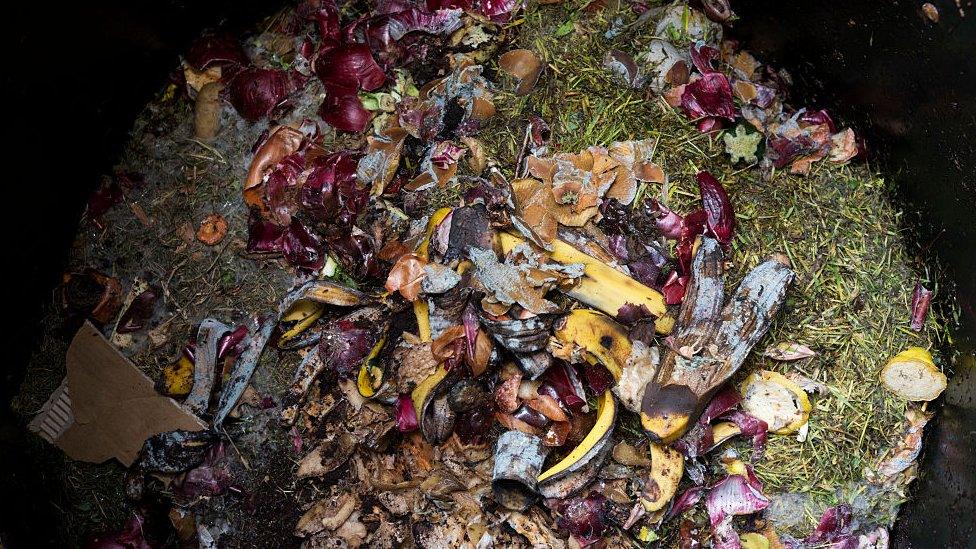
Compost is sometimes referred to as "black gold" by allotment owners and gardeners
Saving grass cuttings and kitchen scraps for the compost bin has long been second nature for those with green fingers. However, sales of compost products soared during the pandemic, and now more people than ever are making so-called "black gold" at home.
With a number of councils halting collection of garden waste during lockdowns and the current HGV driver shortage, dealing with green waste at home is being encouraged like never before.
For the uninitiated, it can seem daunting - whether to follow the hot or cold methods, how to mix greens and browns and what to include and avoid in your heap.
Legions of compost devotees are happy to share their know-how about harnessing the power of microorganisms to turn grass cuttings, prunings and food scraps into compost - and reducing greenhouse gas emissions in the process.
In England, 5.4 million tonnes of biodegradable waste - including items from the garden and discarded food - was sent to landfill sites in 2019.
Once there, it is left to rot and decomposes to produce methane - a potent greenhouse gas.
A single home compost bin diverts approximately 150kg of waste from landfill each year, according to charity Garden Organic.
The compost produced can be used in the garden instead of commercial peat-based products, themselves a contributor to carbon dioxide emissions.
'Focused on sustainability'
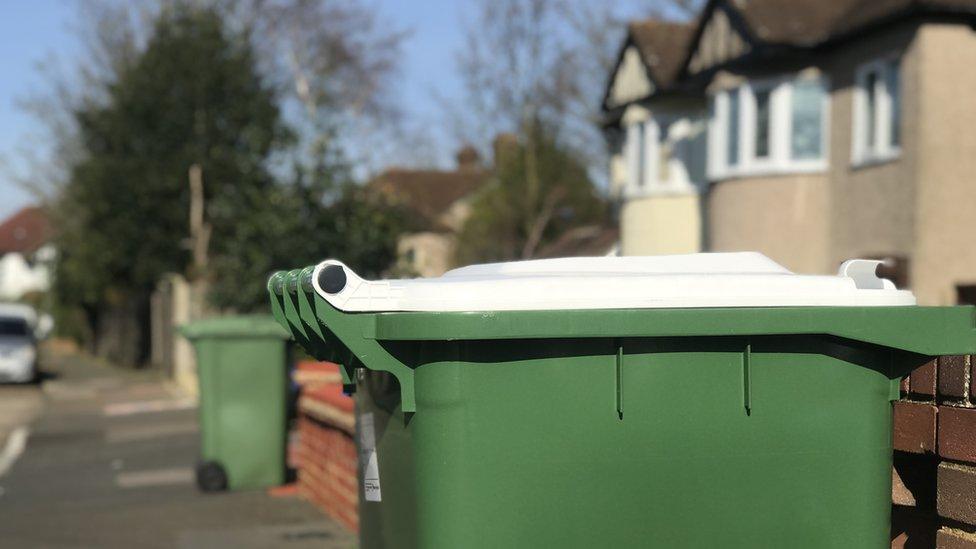
Garden waste collections were halted by some councils because of the pandemic and driver shortages
Jenny Brayshaw, who works for a website manufacturing and selling plastic Dalek-style compost bins in Hull, said demand went "through the roof" at the start of the pandemic.
She said sales from evengreener.com surged from 50,000 in 2019 to 75,000 in 2020.
"It was initially out of necessity when councils paused collecting garden waste," she said. "But we've seen a real shift in how people are thinking about their waste.
"The reasons why people are buying bins has changed - it's not so much about the gardening now, it's more focussed on sustainability and recycling.
"We've changed our approach more towards educating people about why and how to compost and what the benefits are."
'Win win win'
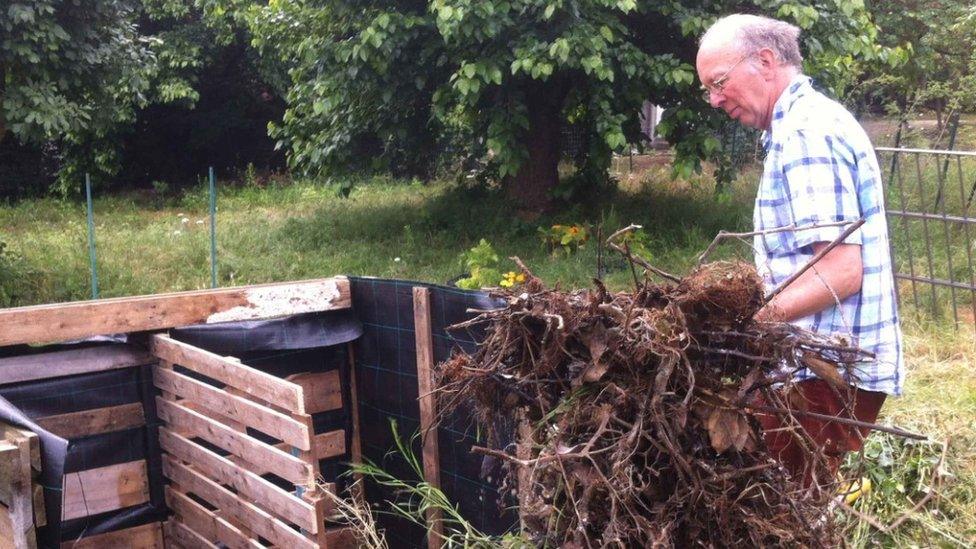
Nicky Scott has worked with councils and community groups to encourage composting
Devon-based writer and compost expert Nicky Scott - known as Dr Compost - has advised councils, schools and community groups over the past 30 years.
"Composting cuts down methane and nitrous oxide, so if you use it intelligently in your garden, it's a win win win situation," he said.
He admitted that "a little bit of knowledge" is needed for people to get started successfully.
"There are perceptions that it is smelly or attracts rats, or maybe the gardening pundits on TV make it overly complicated, so people think 'it's not for me'," he added.
"If it turns to sludge, people just give up. Councils do supply free or subsidised bins but without the know-how about using them, it can be counter productive - they need to demystify it and make it more accessible.
"It should be part of the national school food plan too - if you can get children to understand, the pester power will rub off on the parents."
Master Composters
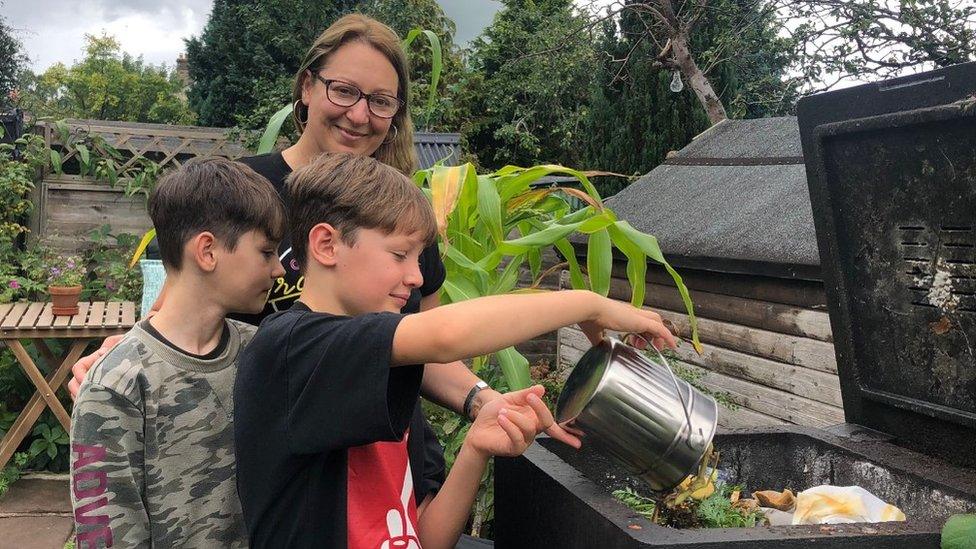
Frankie Kennett has ensured her twin sons are keen composters
Master Composters are a network of compost evangelists set up by the Garden Organic charity to encourage people to recycle their kitchen scraps and garden waste.
Frankie Kennett, from Penrith in Cumbria, developed an interest in composting when she was studying horticulture and saw "unsustainable practices" in gardening.
She has confessed to even saving, drying and crushing eggshells in her bid to minimise waste.
"Composting is just doing what nature does in breaking down organic material," she said. "It's more sustainable and makes plants more healthy.
"There is so much waste going into landfill - composting is just a better way. It saves buying compost, cuts down on transport lorries and waste collections."
While the pandemic limited the Master Composters' ability to attend shows and events, she believes there is a growing interest in composting.
"The pandemic has made people realise they want to grow things at home, so there are more first-time composters and there has definitely been an increase in interest.
"It doesn't need much skill, but if you know how to do it and you have a system it makes it more efficient and you get your compost quicker," she added.

Home composting for beginners
Choose a compost bin to suit your budget and garden space - a basic plastic composter or open enclosures made from wooden pallets are both fine.
Try to locate your bin near the kitchen and your growing area - that way you are more likely to use it.
Mix different materials rather than dumping in, say, a huge bag of grass cuttings in one go.
Layer up vegetable kitchen waste, weed foliage and soft green material, with carbon-rich items such as paper towels and bags, torn up cardboard and toilet roll tubes.
Worried about attracting rats? Avoid putting meat, fish, dairy or cooked food on the heap, and actively turn it regularly and they will stay away.
Teach kids about garden wildlife - dig down a little in your bin to find worms and other soil life that will fascinate children.
If you live in a flat or do not have a garden, try a wormery instead. This is a neat handy stacking system of trays for turning kitchen waste into a nutrient-rich vermicompost.
Source: Garden Organic

Compost in the city
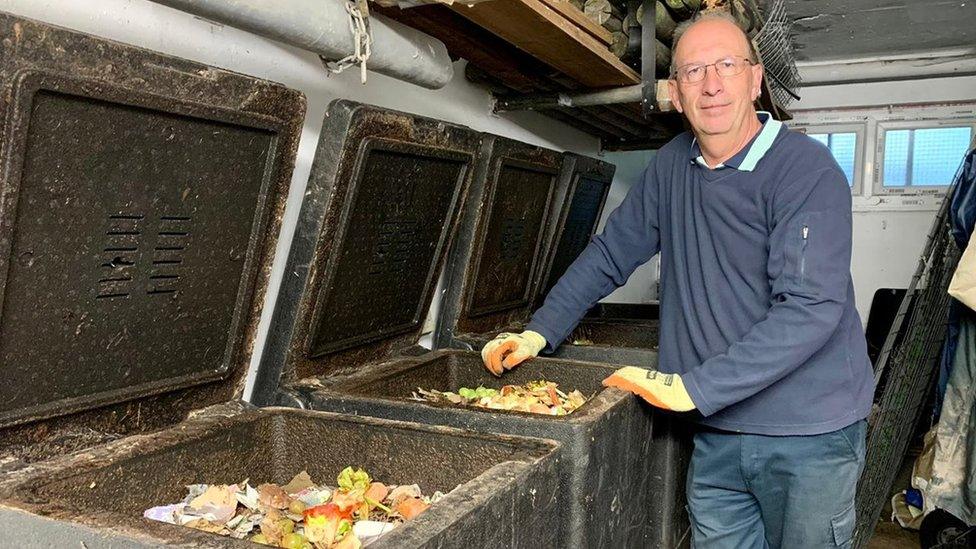
James Ford manages the composting facilities on the St George's Estate
But what if you have no garden or allotment?
James Ford is one a team of volunteers who set up a community composting system on the St George's estate in London's East End with the help of Tower Hamlets Council.
Waste is put in two communal bins and volunteers transfer it into four hotbins and three wormeries that turn out compost for a community orchard, as well as 30 vegetable beds for residents.
Mr Ford said it had created a "small oasis in the middle of the city" with benefits beyond environmental ones.
"It's very sociable and has broken down a lot of cultural barriers," he said.
"It helps people's mental health - when you sit in the orchard among the wildflowers, you could be in the countryside.
"And it's the compost that keeps it all going."
'Overcome challenges'
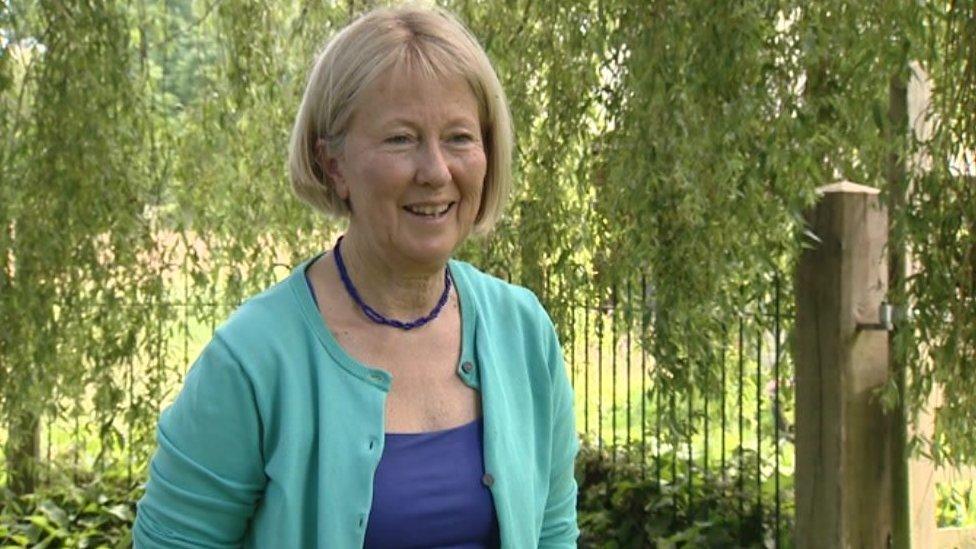
Lindsay Andrews believes home composting is "wonderful"
Lindsay Andrews, from Ringwood Action for Climate Emergency in the New Forest, said despite "a lot of consternation" at the suspension of garden waste collection by the district council, it provided a "tremendous opportunity" for home composting.
The New Forest, along with councils such as Coventry and South Oxfordshire, cut their collections due to the driver shortages, blamed on the pandemic and Brexit.
"The challenges are there to overcome - we shouldn't always have to rely on councils," she said.
In response, volunteers from the local Round Table began collecting green waste bags for a charity donation, with the waste being used for compost at a community tree nursery.
"We make an amazing amount of compost in our own garden and it's wonderful that it all goes back into the land and helps regenerate the soil," said Ms Andrews.
"It's a great way of not putting the waste out and seeing it as someone else's problem."

Follow BBC South on Facebook, external, Twitter, external, or Instagram, external. Send your story ideas to south.newsonline@bbc.co.uk, external.
- Published15 October 2021
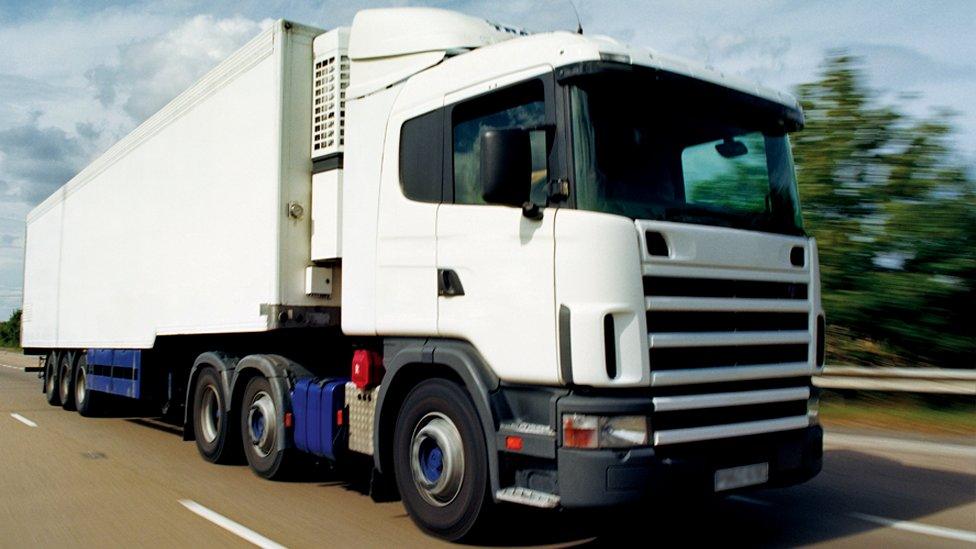
- Published2 April 2021
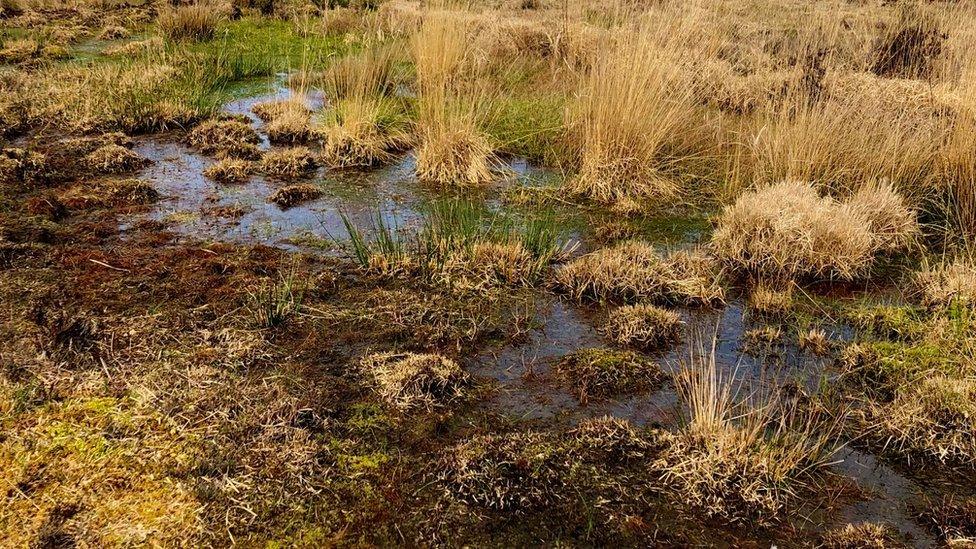
- Published24 March 2020
